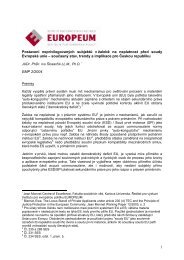eu constitutionalisation - EUROPEUM Institute for European Policy
eu constitutionalisation - EUROPEUM Institute for European Policy
eu constitutionalisation - EUROPEUM Institute for European Policy
Create successful ePaper yourself
Turn your PDF publications into a flip-book with our unique Google optimized e-Paper software.
Chapter 4: Government Coalitions and Institutional Re<strong>for</strong>m at the IGCtions on institutional issues resulted from intra-coalitional trade-offs andcompromises. In both cases, the ‘size identity’ led to ideological affinitiesin regard to the question of balance of power between the member states,however, the states had ideological differences when it came to the questionof the extension of the QMV. Probably, the most important factorin overcoming the differences, apart from the past relationships was thefact that both coalitions were eager to maintain the partnership also inthe future. This goal of ‘strategic positioning’ or the future was especiallypertinent in the view of the EU enlargement.With Spain-Poland as with the ‘Friends’ the prospect of future cooperationis much less clearly identifiable. The coalitions <strong>for</strong>med aroundshared interests, seeking relative-power enhancement and having mostly‘size-identity’ related ideological affinities, as the newcomers’ positionon the federalist-intergovernmentalist dimension was not yet clearly<strong>for</strong>mulated. Hence, I categorise them as tactical coalitions, howevermore stable and more <strong>for</strong>malised than the one’s <strong>for</strong>med between the UKbilaterally with various member states on an issue-by-issue basis. WhileUK certainly is eager to build strategic partnerships <strong>for</strong> future tacticalcoalitional endeavours, it does not <strong>for</strong>malise these relationship. Its tacticalcoalitions, hence, tend to be strictly ad hoc, issue-specific and in<strong>for</strong>mal.Finally, after a failed attempt to <strong>for</strong>m a coalition of the founding ‘Six’, Italydid not display much of coalitional behaviour. During the Convention itappeared generally lacking a negotiation strategy, then it held Presidency,and after a failure of the Brussels Summit in December 2003 largely keptlow profile <strong>for</strong> the rest of the IGC.Chapter 4: Government Coalitions and Institutional Re<strong>for</strong>m at the IGCMaybe one prediction that can be made already is that due to the enlargements,coalitions as power enhancing strategy will remain one of the keyinstruments in EU negotiations. In institutional re<strong>for</strong>m negotiations, the<strong>for</strong>mal coalitions that will occur will necessarily be among small or amonglarge states, but unlikely mixed as such pattern has persisted throughouthistory of <strong>European</strong> integration. It is also plausible to expect that the stablepartnerships are unlikely to break up as there will not exists yet viablealternatives <strong>for</strong> more <strong>for</strong>mal coalitional choices. Like strong relationship,<strong>for</strong>mal coalitions are difficult to build. They take time and ef<strong>for</strong>t and poseopportunity cost. It will still take few years be<strong>for</strong>e there is sufficient mutualunderstanding and trust built between the ‘new’ and ‘old’ states, thatthere could be new <strong>for</strong>mal partnerships built. Much more likely is thatstable coalitions will remain (unless domestic politics initiates a change incoalitional strategy), but these relationships will not be exclusive. Morethan ever, governments will invest resources and time to cultivating strategicpartnerships with other governments. In other words, more thanever a successful governmental strategy in an enlarged and still enlargingEurope means building circles of friends and allies to whom a governmentcan turn <strong>for</strong> support and to whom government offers support when theother side needs it. Reputation of being a cooperative and reciprocicalpartner is crucial.Finally, through analysing the characteristics of the coalitions presentin the 2003/04 IGC negotiations, and the governments’ motivationsunderlying their coalitional choices, I tried to show that coalition-analysiscan add important insights to our understanding of the dynamics ofEU treaty negotiations. Not only we are more able to understand howthe negotiation outcomes came about, but through understanding therelationships between the member states as displayed in tactical andstrategic coalitional choices, we may also be able to predict how thesestates might behave in the future. This, however, is an important pointif we consider that due to stalemate in the ratification process of theconstitutional treaty we may see another constitutional and institutionalre<strong>for</strong>m in not too distant future.136137








